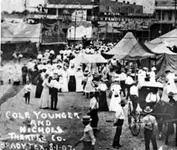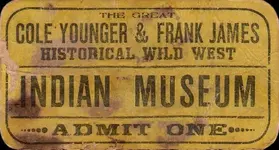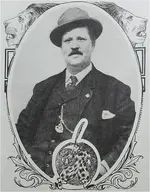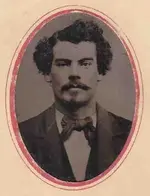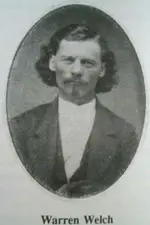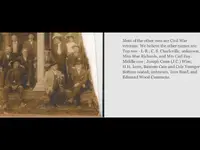Here's one of my messages from several years back where Brown County Historian and History Professsor T. R. Havins is quoted as saying that Cole Younger came to Brownwood in the early 1900s with a "carnival".
~Jay~
-, <jay_longley@yahoo.com> wrote :
I was just retrieving some information from our extensive Messages Archives when I happened across the source of the information that Cole Younger did indeed come to Brownwood with a carnival after he was released from prison. I've been hounded for years by the Smokescreen Gang and other "Bloody Bill" naysayers to produce the source (other than Dr. L.E. Skinner) of that information but I could never locate it, until now. The source I've been seeking for these many years turns out to be probably the most respected of all Brown County historians, the late T. R. Havins! You can either scroll down this message to near the end where Havins is quoted or you can read the entire message which is what I recommend you do as it contains some important facts that are relevant to our work here. The part about Cole Younger visiting the area with the carnival is very important because the naysayers keep denying that Cole Younger was ever in Brownwood and that since he was never here, he couldn't have met with William C. Anderson at his Salt Creek farm/ranch and confirmed that our Bill Anderson was his Guerrilla comrade known as "Bloody Bill" Anderson. Well, here's more proof that they are wrong about both things.
***
From: "Old Brown Trivia" by Lex Johnston (Henry Ford's great
grandson), Brownwood Bulletin. Also in Book No. Eleven of "In The
Life And Lives of Brown County People" by the Brown County Historical
Society. Brownwood Public Library's Locked Case. I encourage our
members to take a close look at the "W.L. (Uncle Billy) Williams" who
is mentioned in this article. Particularly interesting is where
Williams told his party, when starting to engage Indians, that the
fight was "going to be hand to hand." New members need to be aware
that Henry Ford was probably Colonel Anderson's closest confidant
during Brown County's early days.
***
"Most students of Brown County history are aware of the fact that
Henry Ford was a well liked and highly respected leading citizen of
early day Brown county. Numerous articles have been written through
the years concerning his various activities.
He served as county clerk (1876-1884) and as mayor of Brownwood. He
was instrumental in the formation of the county public school system
and Daniel Baker College.
As part owner and operator of a small private bank in Brownwood from
1884 until his death at age 64 in 1910 he was always involved in
various community and church efforts. He was considered by all who
knew him as honest with integrity beyond question.
It was in late summer in 1869, when Ford appeared as a stranger in
the small log-cabin settlement of San Saba. He was hired by the
Forsythe brothers as a cowboy on their isolated ranch in southeast
Brown county.
An unwritten code of the frontier was that no man should ask another
about his background. Unless an individual volunteered such
information his past would never be discussed and, as in Ford's case,
perhaps would never be revealed. His original home was evidently in
Virginia. Unconfirmed sources placed him briefly in Nebraska, Kansas
and Missouri before his arrival in Texas. R.D. Forsythe claimed to
have met him in New Mexico earlier that year. The code, however,
provided a barrier behind which practically all the background of his
youth was permanently hidden.
For two years Ford remained as a cowboy on the Forsythe ranch.
During that time he participated in cattle drives to New Mexico.
While on one drive he demonstrated his ability to use a 'six-
shooter.' The incident, described by R.D. Forsythe, occured on a
ranch near Santa Fe. Bud Forsythe was playing poker. A Mexican in
the game, evidently a poor loser, without warning, jumped from his
chair, with knife in hand, intending to stab Forsythe. Ford, who was
observing from across the room, quickly drew his pistol and shot the
assailant three times.
In 1871 Ford left the Forsythe ranch and became employed by W.L.
(Uncle Billy) Williams who also conducted a large cattle operation in
the same area. In 1872 he began his own cattle herd with borrowed
funds and remained a stockman until 1876. During those years he
married, began a family and lived in the rowdy frontier town of
Williams Ranch. It was during that period of time that the infamous
John Wesley Hardin frequented that area.
Ford was involved in at least two skirmishes with Indian raiding
parties while living in the William Ranch area. Details are sketchy
but years later he recalled one episode in a letter to W.L. Williams
in which he wrote: 'I remember that we were riding side by side at
the time the charge commenced, my first thought was to go to shooting
but you said hold your fire boys it is going to be hand to hand.'
By 1876 it was evident that Henry Ford was well educated. He could
speak several languages, including Greek, French and Spanish, and was
a talented mathematician.
The first regular election in Brown County following reconstruction
was in February, 1876. Ford's friends encouraged him to seek
election to the county clerk position. 'He rejected the idea but
they entered his name on the ballot anyway.' He was elected and
moved to Brownwood that year. His life from that time on was 'open
as a book.'
Henry Ford's activity prior to his arrival at the Forsythe ranch is a
mystery yet unsolved. Very little is known about his antecedents.
Queries from members of his family and friends about his youth always
went unanswered. When pressed on the subject he would become quite
disturbed. His personal papers contain few real clues to his
origin. He wrote to himself only that he was 'a Virginian by
birth.' After his death his wife furnished local newspapers with
sparce information indicating that his place of birth was Wheeling,
Ohio county, Virginia. However a search of the 1850 and 1860 census
records of that county fails to locate him there at that time.
A rumor that Ford had assumed a new name when he came to Texas was
often repeated.
A family legend is that he, in about 1865, shot a federal army
officer in retaliation for an insult to his sister, after which he
promptly left home.
A few rumors during his life, and many after his death, connected
Ford with the noted frontier outlaw gangs led by Jesse James and Cole
Younger. Many ridiculously believed he actually was Jesse James.
For years after his death various members of his family were
contacted by several individuals with tales that associated him with
James, Younger and the infamous Quantrell's guerilla army during the
civil war. A close study of James, Younger and Quantrell produces
nothing factual which associated him with any of their outlaw
escapades.
An interesting event that created more speculation about Ford's past
occured in the mid-1880's. At that time two men rode into Brownwood
and proceeded to rob the Coggin, Ford, Martin Bank. While the
robbery was in progress Ford, unaware of the situation, arrived on
the scene. He and the robbers recognized each other. They greeted
each other by name and their dialogue suggested a friendship of
previous years. The robbery was promptly called off.
Many ex-members of Quantrell's army came to Texas after the Civil War
and it is interesting to note that in 1869, when Ford arrived in San
Saba, the James brothers were hiding in southwest Texas and the
Youngers were in Scyene (near Dallas), Texas.
In 1901 Cole Younger was released from prison. He and Frank James
organized a carnival and toured the United States. The show came to
Brownwood which prompted one author to write that 'James and Younger
visited their old friend Henry Ford.' The late Brown County
historian T.R. Havins referred to that meeting as follows: 'I
remember Cole Younger's carnival came to Brownwood, and I witnessed a
greeting of Younger by Ford and they called each other Henry and
Cole.'
After sifting through the many rumors and stories about Henry Ford's
background and with careful consideration of known facts, it is
reasonable to conclude that he did leave Virginia 'on the run' in
about 1864. He probably was a member of Quantrell's guerrilla army
during the later months of the Civil War, as were Jesse James and
Cole Younger. James, Younger and Ford were the same age and they
undoubtedly knew each other at that time. It is unlikely Ford used
an assumed name but he protected the mystery of his youth until his
death."
***
~Texas Jay
View attachment 1536008





